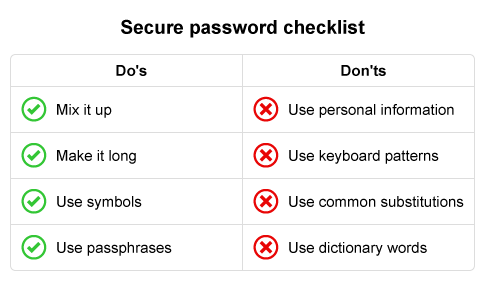Which of the following is not a component of a secure password?
Below is the code for an example image modal link
Flashcards
/* -- Un-comment the code below to show all parts of question -- */
| A. Symbols. | ||
| B. Dictionary words. | ||
| C. Mixed-case letters. | ||
| D. Multiword phrases. |
Passwords authenticate users and prevent unauthorized access to systems and data. Weak passwords provide inadequate protection against computer password cracking.
Easy passwords to crack are those that:
- Are short (ie, 10 characters or fewer)
- Use personal information such as names (eg, relatives) and dates (eg, birthdays)
- Use whole words (eg, dictionary words, foreign words)
- Use keyboard patterns (eg, QWERTY, 098765)
- Use common substitutions (eg, "SL33P")
Using dictionary words makes the password susceptible to brute-force password-hacking software. This software typically uses dictionaries, words from foreign languages, and character substitution lists (eg, replacing "a" with a "@") to crack passwords.
(Choices A, C, and D) Protocols for strong passwords encourage the use of random, mixed-case letters, numbers, and symbols (eg, "%" or "!"). A multiword phrase (ie, passphrase), composed of multiple words in the form of a statement should be used instead of a password composed of a single word. Passphrases are difficult to crack but easy to remember (eg, "The school bus will be here @ 4 P.M."). A passphrase may include dictionary words because it is typically a statement whose complexity and length make it difficult to crack.
Things to remember:
Elements of a strong password include substantial length; random, mixed-case letters and numbers; and symbols. A password should not use dictionary words, which are easily cracked by computer hacking programs. Using a passphrase that incorporates all elements of a strong password is recommended.
Lecture References :
- AUD 10.02 : Understanding an entity’s controls: Control environment, IT general controls, and entity-level controls




